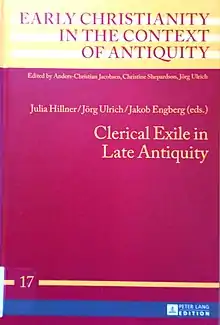Julia Hillner
Julia Hillner is Professor of Medieval History at the University of Sheffield. She is known in particular for her work on late antiquity and her application of digital methods of social network analysis to large data sets drawn from a wide variety of late antique and early medieval sources.[1]
Julia Hillner | |
|---|---|
 | |
| Nationality | German |
| Academic background | |
| Alma mater | University of Bonn, University of Perugia, University of Padova |
| Academic work | |
| Discipline | Classics, Late antiquity |
| Institutions | University of Sheffield |
Career
Hillner studied for her Staatsexamen and PhD at the University of Bonn. She completed her PhD in 2001, which included a one-year visiting doctoral fellowship at the University of Padova (1997-8).[2] Her revised doctoral thesis was published in 2004 as Jedes Haus ist eine Stadt : Privatimmobilien im spätantiken Rom.[3]
From 1999 Hillner worked on the Arts and Humanities Research Council project Religion, Dynasty and Patronage in Rome, c. 440-840 at the University of Manchester.[4] She became a teaching fellow in Early Christianity and was a British Academy Postdoctoral Fellow from 2003 to 2008 working on Imprisonment in Late Antiquity: Christian Memory and Social Reality.[5][6][7] Hillner moved to the University of Sheffield in 2008.[1]
Hillner's work on imprisonment in late antiquity resulted in her publication Prison, Punishment and Penance in Late Antiquity (Cambridge University Press, 2015) which won an Honorable Mention at the 2016 PROSE Awards.[8][9]
From 2014 to 2017 Hillner was the Principal Investigator of The Migration of Faith: Clerical Exile in Late Antiquity, an Arts and Humanities Research Council funded project in collaboration with the Digital Humanities Institute at the University of Sheffield, the Faculty of Theology at the University of Halle, the Department of Culture and Society at Aarhus University, the Abteilung Byzanzforschung at the Austrian Academy of Sciences, and the German Historical Institute in London.[10][11][12] This innovative project examined the banishment of Christian clerics across the Mediterranean during the religious controversies of late antiquity and how this shaped the institution of the Christian church. It constructed an online prosopographical database of exiled clerics from a wide variety of source material including contemporary epigraphy, histories, hagiography, and letters.[13] The project also resulted in the publication of a number of books and articles on the subject,[14] including an edited volume Clerical Exile in Late Antiquity, the publication of the XVII International Conference on Patristic Studies held at the University of Oxford in 2015.[15][16][17]
In 2018, Hillner started a new project funded by the Leverhulme Trust on Women, Conflict and Peace: Gendered Networks in Early Medieval Narratives (c. 330-735).[18][19] The project will run from 2018 to 2020 and focuses on how women and their networks fitted into the narrative of conflict and peace during the turbulent period of the 4th to 8th centuries. Hillner's work will again use digital methods of network analysis to focus on the social roles of women rather than studying individuals and will use material from a wide variety of late antique and early medieval sources.[19]
Hillner is also under contract with Oxford University Press to write a biography of Helena, mother of the emperor Constantine for the Women in Antiquity series.[1][20] The book is planned to examine Helena in the context of a network of female contacts and the social parameters of late antique women. Hillner writes a blog dedicated to the subject of Helena and her life called Writing Helena.[21]
Hillner is a Director of the Medieval and Ancient Research Centre at the University of Sheffield (MARCUS)[22] and member of the Faculty of Archaeology, History and Letters of the British School at Rome (2017-2021).[1] She is a member of the editorial board for the Journal of Roman Studies.[23]
Hillner lectured on "Empresses, Bishops and Exile in Late Antiquity: A Quantitative Approach" on 4 April 2018 at Ohio State University.[24]
Selected publications
- 'Empresses, Queens, and Letters: Finding a ‘Female Voice’ in Late Antiquity?', Gender & History, vol. 31, issue 2 (2019), 353-382 (open access here: https://onlinelibrary.wiley.com/doi/full/10.1111/1468-0424.12427)
- 'Domus, Family, and Inheritance: the Senatorial Family House in Late Antique Rome.' Journal of Roman Studies 93 (2003): 129–45.[25]
- Jedes Haus ist eine Stadt: Privatimmobilien im spätantiken Rom. Bonn, R. Habelt. 2004.[26]
- 'Clerics, property and patronage: the case of the Roman titular churches.' Antiquité Tardive 14 (2006): 59-68.[27]
- ed. with Kate Cooper. Religion, Dynasty, and Patronage in Early Christian Rome, 300-900. Cambridge, Cambridge University Press. 2007.[28]
- 'Monastic Imprisonment in Justinian's Novels.' Journal of Early Christian Studies 15, no. 2 (2007): 205-237.[29]
- 'Monks and children: corporal punishment in Late Antiquity', European Review of History: Revue européenne d'histoire, 16:6 (2009): 773-791.[30]
- Prison, Punishment, and Penance in Late Antiquity. Cambridge, Cambridge University Press. 2015[31][32]
- ed. with Jörg Ulrich and Jakob Engberg. Clerical Exile in Late Antiquity. Peter Lang, Frankfurt. 2016.[33]

External links
- University of Sheffield staff page
- The Phoenix City: Rome in Late Antiquity 200-600 AD - lecture by Julia Hillner, University of Sheffield 2013
- Clerical Exile and Late Antique Communities - lecture by Julia Hillner at the Institute of Classical Studies, Thursday, 7 March 2019
References
- Sheffield, University of. "Hillner, Julia - Staff - History - The University of Sheffield". www.sheffield.ac.uk. Retrieved 20 August 2018.
- Hillner, Julia (2004). Jedes Haus ist eine Stadt: Privatimmobilien im spätantiken Rom (in German). Bonn: R. Habelt. ISBN 3774932220. OCLC 57066908.
- "Description: Jedes Haus ist eine Stadt (Julia. Hillner)". bonnus.ulb.uni-bonn.de. Retrieved 4 September 2018.
- "Discover - Religion, Dynasty and Patronage in Rome, c.440-840". discover.ukdataservice.ac.uk. Retrieved 20 August 2018.
- "British Academy Review (Issue 7 2003)" (PDF). 2003. Retrieved 20 August 2018.
- Cooper, Kate; Hillner, Julia (September 2007), "Introduction", Religion, Dynasty, and Patronage in Early Christian Rome, 300–900, Cambridge University Press, pp. 1–18, doi:10.1017/CBO9780511482731.001, ISBN 9780511482731
- Cooper, Kate; Hillner, Julia (11 February 2010). Religion, Dynasty, and Patronage in Early Christian Rome, 300-900. Cambridge University Press. ISBN 9780521131278.
- "2016 Award Winners - PROSE Awards". PROSE Awards. Retrieved 20 August 2018.
- "Julia Hillner | The Department of History". history.dept.shef.ac.uk. Retrieved 20 August 2018.
- "The Migration of Faith: Clerical Exile in Late Antiquity (325-c.600AD)". UK Research and Innovation. Retrieved 20 August 2018.
- "Staff". The Migration of Faith. 23 September 2014. Retrieved 22 August 2018.
- "Clerical Exile in Late Antiquity". DHI. 7 October 2014. Retrieved 22 August 2018.
- "Database". The Migration of Faith. 3 October 2014. Retrieved 22 August 2018.
- "Books and articles". The Migration of Faith. 3 October 2014. Retrieved 22 August 2018.
- "Clerical Exile in Late Antiquity - Research - Aarhus University". pure.au.dk. Retrieved 22 August 2018.
- Hillner, Julia; Ulrich, Jörg; Engberg, Jakob, eds. (15 September 2016). Clerical Exile in Late Antiquity. doi:10.3726/978-3-653-06051-5. ISBN 9783631694275.
- "patristics". patristics. Retrieved 22 August 2018.
- "Leverhulme Trust Research Project Grants 2018" (PDF). Retrieved 22 August 2018.
- Sheffield, University of. "Leverhulme Trust project grant for a project entitled 'Women, Conflict and Peace: Gendered Networks in Early Medieval Narratives' - News - Faculty of Arts and Humanities - Faculties - The University of Sheffield". www.sheffield.ac.uk. Retrieved 20 August 2018.
- "Women in Antiquity - Oxford University Press". global.oup.com. Retrieved 22 August 2018.
- "Writing Helena". Writing Helena. Retrieved 22 August 2018.
- "Members". MARCUS. 2 September 2014. Retrieved 22 August 2018.
- "Editorial board". Cambridge Core. Retrieved 1 November 2018.
- ""Empresses, Bishops and Exile in Late Antiquity: A Quantitative Approach," Julia Hillner, Sheffield University". Department of History. 8 March 2018. Retrieved 22 August 2018.
- Hillner, Julia (2003). "Domus, Family, and Inheritance: the Senatorial Family House in Late Antique Rome*". The Journal of Roman Studies. 93: 129–145. doi:10.2307/3184642. ISSN 1753-528X. JSTOR 3184642.
- Hillner, Julia (2004). Jedes Haus ist eine Stadt: Privatimmobilien im spätantiken Rom (in German). R. Habelt.
- Hillner, Julia (2006). "Clerics, property and patronage: the case of the Roman titular churches". Antiquité Tardive. 14: 59–68. doi:10.1484/j.at.2.302421. ISSN 1250-7334.
- Cooper, Kate; Hillner, Julia (13 September 2007). Religion, Dynasty, and Patronage in Early Christian Rome, 300–900. Cambridge University Press. ISBN 9781139468381.
- Hillner, Julia (29 June 2007). "Monastic Imprisonment in Justinian's Novels". Journal of Early Christian Studies. 15 (2): 205–237. doi:10.1353/earl.2007.0033. ISSN 1086-3184.
- Hillner, Julia (2009). "Monks and children: corporal punishment in Late Antiquity1*". European Review of History. 16 (6): 773–791. doi:10.1080/13507480903368046. ISSN 1350-7486.
- Barry, Jennifer (2016). "Review of: Prison, Punishment, and Penance in Late Antiquity". Bryn Mawr Classical Review. ISSN 1055-7660.
- Washburn, Daniel (25 May 2016). "Prison, Punishment and Penance in Late Antiquity by Julia Hillner (review)". Classical World. 109 (3): 434–435. doi:10.1353/clw.2016.0039. ISSN 1558-9234.
- Hillner, Julia; Ulrich, Jörg; Engberg, Jakob (2016). Clerical Exile in Late Antiquity. Peter Lang. ISBN 9783631665978.